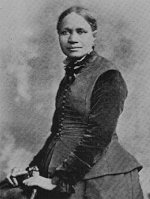
Iola Leroy
Encyclopedia

Novel
A novel is a book of long narrative in literary prose. The genre has historical roots both in the fields of the medieval and early modern romance and in the tradition of the novella. The latter supplied the present generic term in the late 18th century....
by Frances Harper
Frances Harper
Frances Ellen Watkins Harper was an African American abolitionist and poet. Born free in Baltimore, Maryland, she had a long and prolific career, publishing her first book of poetry at twenty and her first novel, the widely praised Iola Leroy, at age 67.-Life and works:Frances Ellen Watkins was...
, is one of the first novels published by an African-American
African American
African Americans are citizens or residents of the United States who have at least partial ancestry from any of the native populations of Sub-Saharan Africa and are the direct descendants of enslaved Africans within the boundaries of the present United States...
woman.
Plot introduction
Iola Leroy, or Shadows Uplifted, is the story of Iola Leroy, beautiful young daughter of a wealthy white Mississippi planter and his mixed-race wife, a former slave he has freed and married. Iola is sent north to be educated and, after the death of her father, kidnapped, told that she has NegroNegro
The word Negro is used in the English-speaking world to refer to a person of black ancestry or appearance, whether of African descent or not...
blood, and is sold into slavery down south. In a plot that follows the conventions of the Tragic mulatto
Tragic mulatto
The Tragic mulatto is a stereotypical fictional character that appeared in American literature during the 19th and 20th centuries. The "tragic mulatto" is an archetypical mixed race person , who is assumed to be sad or even suicidal because they fail to completely fit in the "white world" or the...
genre, Iola struggles to elude the depraved intentions of her various owners and, after she is freed by the Union Army
Union Army
The Union Army was the land force that fought for the Union during the American Civil War. It was also known as the Federal Army, the U.S. Army, the Northern Army and the National Army...
, she seeks to find her scattered family members, to embrace her heritage, and to devote herself to improving the social and economic condition of blacks in America. Iola is supported in her struggle by her brother, Harry, who also refuses to pass as white, a devoted former slave, Tom Anderson, who rescues her from a lecherous master, and a newfound uncle, Robert Johnson, who introduces her to her dark-skinned grandmother Harriet.
After the war Leroy continues to embrace her heritage. She declines to pass
Passing (racial identity)
Racial passing refers to a person classified as a member of one racial group attempting to be accepted as a member of a different racial group...
for white when New England
New England
New England is a region in the northeastern corner of the United States consisting of the six states of Maine, New Hampshire, Vermont, Massachusetts, Rhode Island, and Connecticut...
suitor Dr. Gresham makes it a condition of his proposal of marriage. He wants her to promise never to reveal her race.
Instead, Leroy marries Dr. Frank Latimer, who also has mixed ancestry and identifies with the black community. They return to North Carolina
North Carolina
North Carolina is a state located in the southeastern United States. The state borders South Carolina and Georgia to the south, Tennessee to the west and Virginia to the north. North Carolina contains 100 counties. Its capital is Raleigh, and its largest city is Charlotte...
to fight for "racial uplift." The novel also features Iola's search for her family, from whom she was separated in the war. After a series of coincidence
Coincidence
A coincidence is an event notable for its occurring in conjunction with other conditions, e.g. another event. As such, a coincidence occurs when something uncanny, accidental and unexpected happens under conditions named, but not under a defined relationship...
s, the family is reunited.
Literary significance and criticism
Iola Leroy was for some time cited as the first novel by an African-American author. Professor Henry Louis Gates, Jr.Henry Louis Gates, Jr.
Henry Louis “Skip” Gates, Jr., is an American literary critic, educator, scholar, writer, editor, and public intellectual. He was the first African American to receive the Andrew W. Mellon Foundation Fellowship. He has received numerous honorary degrees and awards for his teaching, research, and...
's 1982 rediscovery of Harriet Wilson's Our Nig
Our Nig
Our Nig: Sketches from the Life of a Free Black is an autobiographical slave narrative by Harriet E. Wilson. It was published in 1859 and rediscovered in 1982 by professor Henry Louis Gates, Jr.. It is considered the first novel published by an African-American on the North American...
(1859) displaced it from that spot. Later, William Wells Brown's 1853 novel Clotel, or the President's Daughter, although initially published in England, came to be viewed as the first novel by an African American author. Harper's novel remains important as one of the earliest novels written by an African American and as a fictional work dealing with complex issues of race, class, and politics in the United States.
Recent scholarship suggests that Harper's novel gives Americans a more sophisticated understanding of citizenship, gender, and community, particularly the way that African Americans developed hybrid forms of gemeinschaft and gesellschaft before, during, and after slavery.
External links
- Terry Novak, Iola Leroy, Literary Encyclopedia

